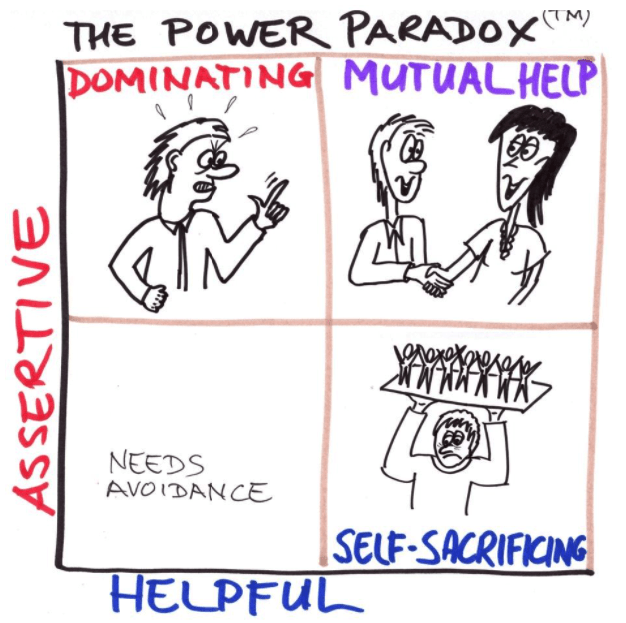
READ: Are You Being Too Helpful For Your Own Good?
 One of the greatest challenges of leadership is how to use the level of power you have to ensure mutual needs are met. This is the key to enduring and positive relationships. While it’s great to be helpful, if it’s not balanced it can lead to unintended consequences like not achieving the key result you are accountable for because they require your attention and skills. However, if you are overly assertive and only ensure that your own needs are met you end up being self-centred and dominating which can rapidly erode trust and undermine the possibility of long term relationships.
One of the greatest challenges of leadership is how to use the level of power you have to ensure mutual needs are met. This is the key to enduring and positive relationships. While it’s great to be helpful, if it’s not balanced it can lead to unintended consequences like not achieving the key result you are accountable for because they require your attention and skills. However, if you are overly assertive and only ensure that your own needs are met you end up being self-centred and dominating which can rapidly erode trust and undermine the possibility of long term relationships.
In an increasingly inter-dependent world where businesses rely on trusting relationships with suppliers and partners, it is critical to be aware of your personal preferences in this area. Within a business or organisation there is also a high level of interdependence between teams. I frequently get complaints from senior Directors that teams are not supporting one another enough because there is a tendency for people to look after their own team’s needs and neglect the needs of other teams.
When I’m asked to coach Managers and Directors who are not performing to the expectations of their role, they are often struggling with their strong desire to help their team but neglect their own needs. This not only leads to their people becoming dependent on them, it can build up resentment in the manager and when the pressure gets to a certain level they ‘Flip’ and become very demanding or dominating. It is not unusual for this to be combined with becoming harsh, especially if the manager is uncomfortable with enforcing rules and boundaries (for more on this click here).
Avoid Emotional Explosions
If you are being excessively helpful all the time you are creating the expectation in others that you will always meet their needs. This can lead to sacrificing your own needs and if you do flip to dominating it is often a surprise to others because they don’t know that you are not necessarily getting your own needs met. This dynamic also shows up quite frequently in personal relationships where one partner unconsciously takes the other for granted and assumes everything is fine until there is an emotional explosion. The flip to suddenly becoming dominating can often be deemed unreasonable but it was only because the self-sacrificing behaviour was not noticed or acknowledged. That’s the problem with this stuff – it’s often operating at an unconscious level.
If we want to develop enduring relationships at work and at home we all have a duty to be more conscious of how much power we are exerting and how effectively we are meeting the needs of others as well as our own. This means finding the right balance and pursuing ‘Mutual Help’.
The Paradox of Mutual Help
As many regular readers know I now work with a very interesting assessment tool developed by Dr. Dan Harrison. His background in Mathematics, Personality Theory, Counselling and Organizational Psychology has enabled him to make a rather unique and exceptional contribution to assessment methodology.
There are many different Assessment reports available in the Harrison System and one of my favourites is the Paradox Report®. A Paradox (Greek: para = against, dóxa = opinion, view) is a statement that seems to contradict itself or contradict common sense but which contains a truth.
This report uses Dan’s unique methodology to combine pairs of primary traits in a way that distinguishes four sub-traits. Each primary is either ‘dynamic’ or ‘gentle’. If the dynamic trait is too strong and not balanced by the gentle trait, it can become an ‘Aggressive Imbalance’. On the other hand if the gentle trait is too strong and not balanced, you can get a ‘Passive Imbalance’. These imbalances can lead to less effective working relationships and interfere with a person’s success. When you have two complimentary (paradoxical) traits in good measure you can demonstrate versatility in behaviour by combining them to achieve positive outcomes which benefit others while also helping you to succeed.
The two primary traits in the ‘Power’ Paradox are Assertive and Helpful:
- Assertive (dynamic trait) is the tendency to put forward personal wants and needs.
- Helpful (gentle trait) is the tendency to respond to others’ needs and assist or support others to achieve their goals.
The Paradox is illustrated below.

Balances and Imbalances
The four sub traits in the Power Paradox® are:
Mutual Help (Balanced Versatility) – The tendency to pursue solutions that are beneficial to all parties concerned (High Assertive and High Helpful). This leads to highly effective behaviours that build enduring mutually beneficial relationships and strong teams.
Self-Sacrificing (Passive Imbalance) – The tendency to respond to others’ needs at the expense of one’s own needs (Low Assertive and High Helpful). This can lead to personal burn-out and making others dependent on you. Under pressure this trait may flip to the opposite and become dominating because you feel taken advantage of.
Dominating (Aggressive Imbalance) – The tendency to be assertive with one’s own needs while failing to respond to other people’s needs (High Assertive and Low Helpful). This undermines trust and builds resentment in others. Under pressure this trait can flip to self-sacrificing due to feeling sorry for others or judging them to be helpless or incapable of doing anything without you.
Needs Avoidance (Balanced Deficiency) – The tendency to lack assertiveness as well as helpfulness (Low Assertive and Low Helpful). This trait neither responds to the needs of others nor expresses personal needs, which is particularly ineffective because it reduces personal energy and can drain the energy of a team.
It is worth mentioning that if someone has a very strong aggressive or passive imbalance it can lead to rigidity in thinking and behaviour, focusing blindly on the positive indicators of that trait. For example, a Domineering person will think that being assertive is a virtue and helpfulness demonstrates weakness that would easily be taken advantage of. Likewise a very helpful person may have a belief that being assertive is rude, arrogant and condescending. This means that they may struggle with the need to be more assertive themselves and stay trapped in self-sacrificing behaviour until they burn out.
Increasing self-awareness
All the latest thinking on leadership is emphasising Self-awareness as the key to success. How can you lead others if you can’t lead yourself because you are still driven by your unconscious personal tendencies? What do you need to become more conscious of in order to become even more effective?
To explore any of the above issues and to see where you stand on the Power Paradox, as well as the 11 other paradoxes in this unique assessment, just contact Amanda at info@talent4performance.co.uk.
We also facilitate team reports so you can identify the strengths and imbalances in your key teams. This can lead to powerful insights that increase collaboration and effectiveness.
Remember, especially as you consider how you exert your power . . . Stay Curious!
With best regards,
David Klaasen



